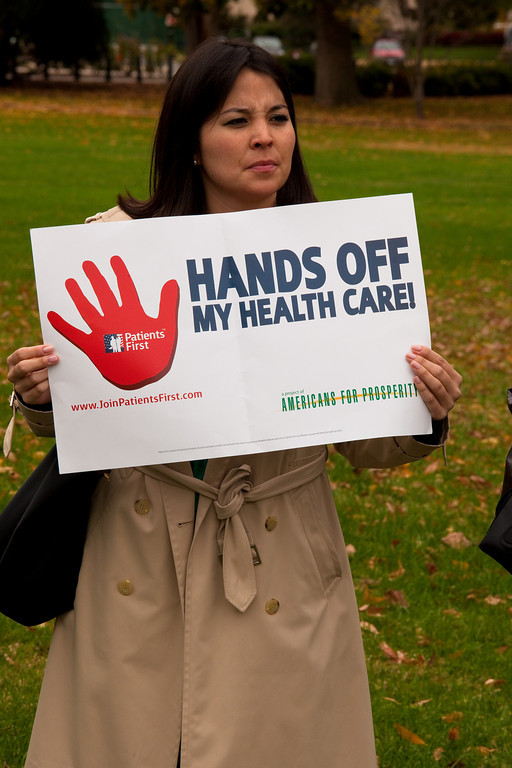Democrats on Capitol Hill are bracing for a mass influx of Tea Party activists today. And to make sure things go smoothly, a leadership aide sent a memo to the offices of freshman and sophomore members, with some advice about how to handle the visitors, and some useful talking points about the health-care bill.
The email from Doug Thornell, an aide to Rep. Chris Van Hollen, who chairs the DCCC, follows:
From: Thornell, Doug
Sent: Monday, March 15, 2010 5:25 PM
To: Thornell, Doug
Subject: Tea Party EtiquetteTO: Freshman and Sophomore House Democrats
FROM: Office of the Assistant to the Speaker
DATE: March 15, 2010
RE: Tea Party Etiquette
As many of you have read, tomorrow, Tuesday, March 16, 2010, tens of thousands of conservative and Tea Party activists will be on the Hill as part of what they are dubbing a “Surge Against Obamacare.” Rick Scott, a multimillionaire investor and former hospital executive, is helping to lead the grassroots effort along with a number of other groups on the right like Dick Armey’s FreedomWorks. While many of you have met with outspoken activists in your districts in the past, we wanted to remind you of some of the best practices to review with your DC staff:
1. Be prepared. Activists are expected to begin arriving around 9am and they have been given instructions to wait in your office until they can have a meeting. Please have an orderly process and enough staff and interns to welcome what could be a very large number of visitors throughout the day:
· Have staff and/or Member time set-aside to visit with attendees in small groups;
· Ask for extra chairs or seating to be brought to your office or the hall in case there are seniors or disabled visitors that need to be accommodated;
· Consider having some light snacks, H2O, and coffee available;
· Ask visitors to leave all signs and banners outside the office.
2. Prioritize listening to your constituents:
· Have multiple guest books/comment sheets available for all visitors to sign-in and leave comments – we recommend you have one for residents of your district, one for residents of your state (but not your district), and one for out-of-state visitors. Have a Capitol Directory and map available to direct visitors to their Member of Congress and written instructions on how to get over to the Senate side of the Hill.
· There is limited rationale for your Member to meet with out-of-district constituents, especially if you already had other business or meetings previously scheduled with constituents who had planned to visit with you tomorrow on other topics. It is up to individual offices to decide if staff would like to take these meetings.
3. Listen and communicate in small groups:
· As we learned in August, small groups are typically the best venue for exchanges on this complicated topic.
· Many of the conservative activists are not opposing the actual provisions in the bill, but are instead reacting to a caricature of the reform bill presented by right-wing media outlets. In fact, many conservative and GOP ideas and concerns are addressed in the legislation:
ü Reduces the deficit;
ü Cracks down on Medicare waste, fraud, and abuse;
ü Provides historic tax credit for small businesses and individuals to purchase health insurance;
ü Allows consumers to shop for health insurance across state lines via multi-state compacts;
ü Inaugurates medical malpractice reforms, (an area where the GOP failed to take any action when in charge of Congress for 12 years).
· Also, don’t assume common myths about this bill have been debunked. Be prepared to explain that there are no death panels, that Medicare is in fact strengthened, and that reform is not a government take-over, but it is an attempt to crack down on the abusive practices of health insurance companies by providing oversight and increasing competition.
· Finally, work to establish common-ground with visitors by ensuring they are aware and supportive of the important changes that will take place immediately:
ü Offer tax credits to small businesses to purchase coverage;
ü Prohibit pre-existing condition exclusions for children in all new plans;
ü Provide immediate access to insurance for uninsured Americans who are uninsured because of a pre-existing condition through a temporary high-risk pool;
ü Prohibit dropping people from coverage when they get sick in all individual plans;
ü Eliminate lifetime limits and restrictive annual limits on benefits in all plans;
ü Require premium rebates to enrollees from insurers with high administrative expenditures and require public disclosure of the percent of premiums applied to overhead costs;
ü Ensure consumers have access to an effective internal and external appeals process to appeal new insurance plan decisions;
ü Require plans to cover an enrollee’s dependent children until age 26;
ü Require new plans to cover preventive services and immunizations without cost-sharing;
ü Relief on the Donut Hole.
If you have any questions, please let us know.
The Tea Party group organizing the visits got a hold of the email and is touting it as “breaking news.”









